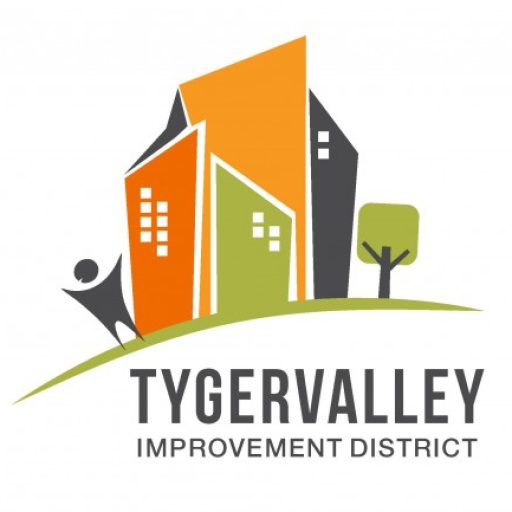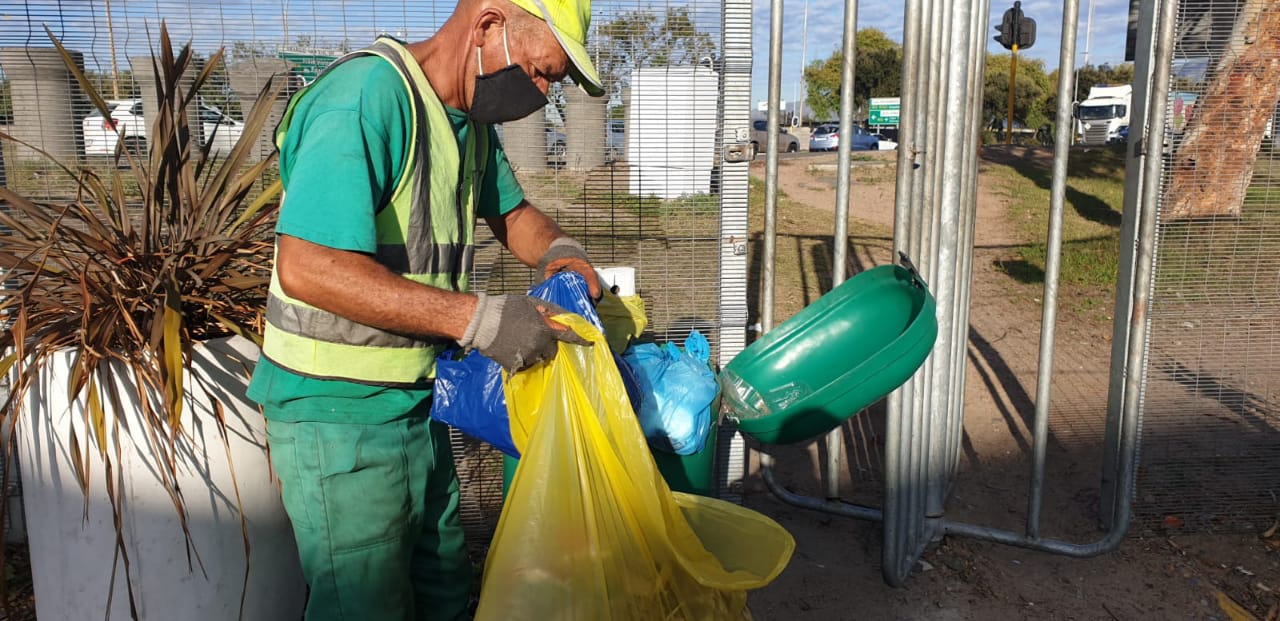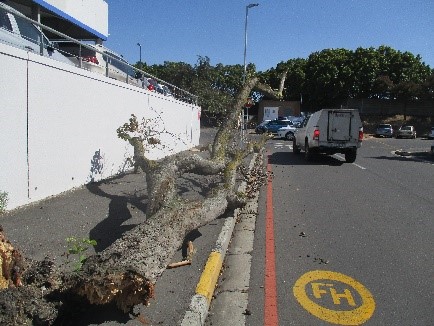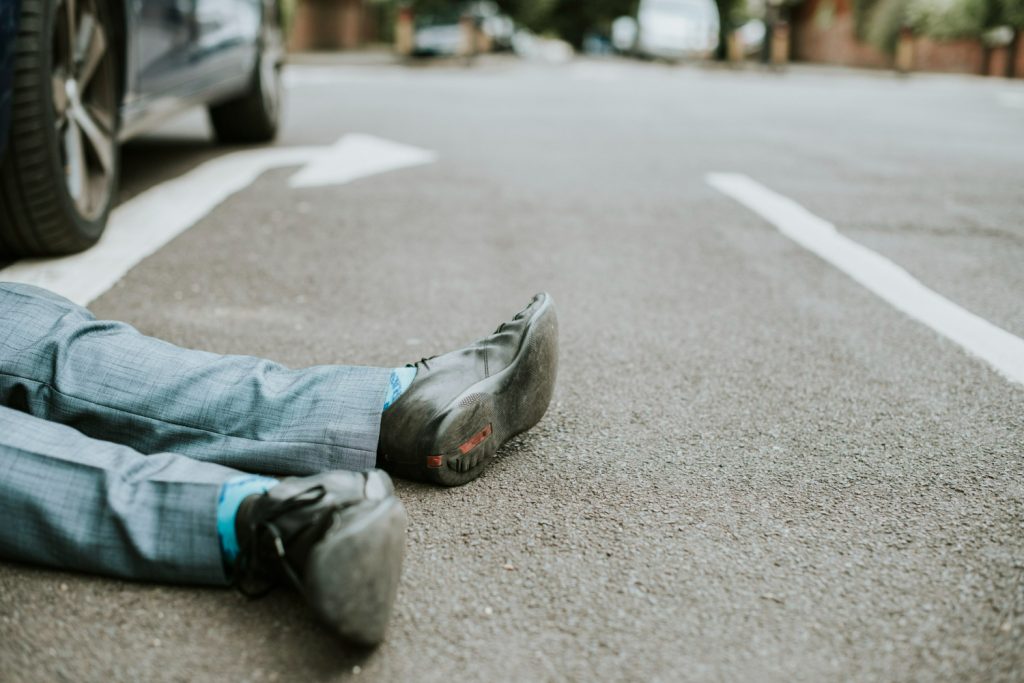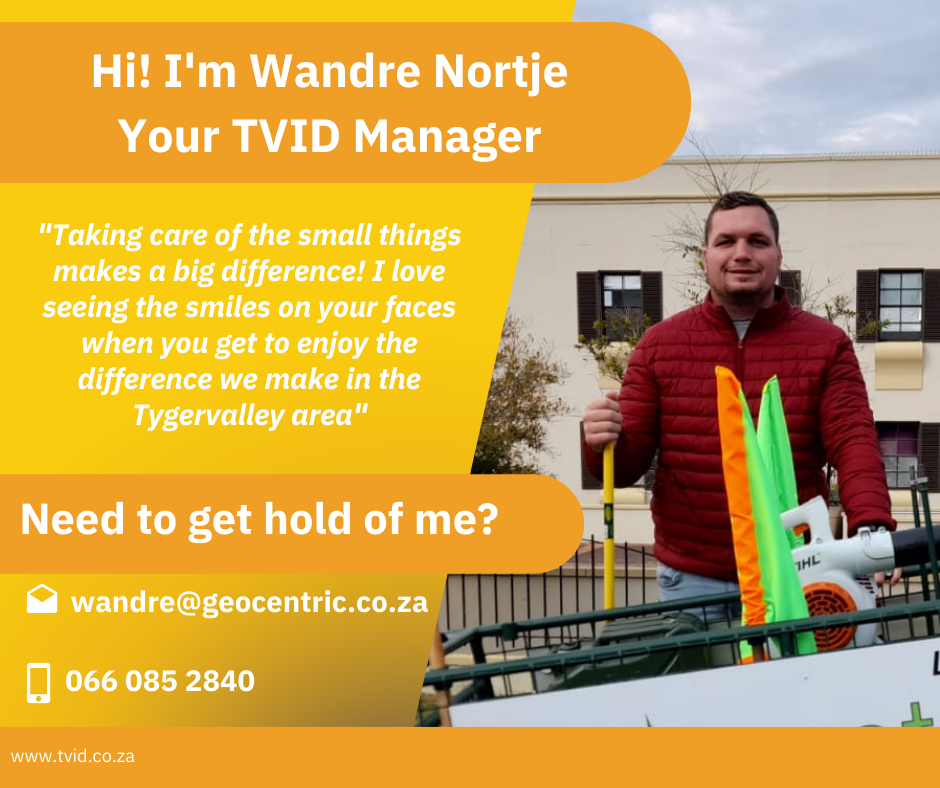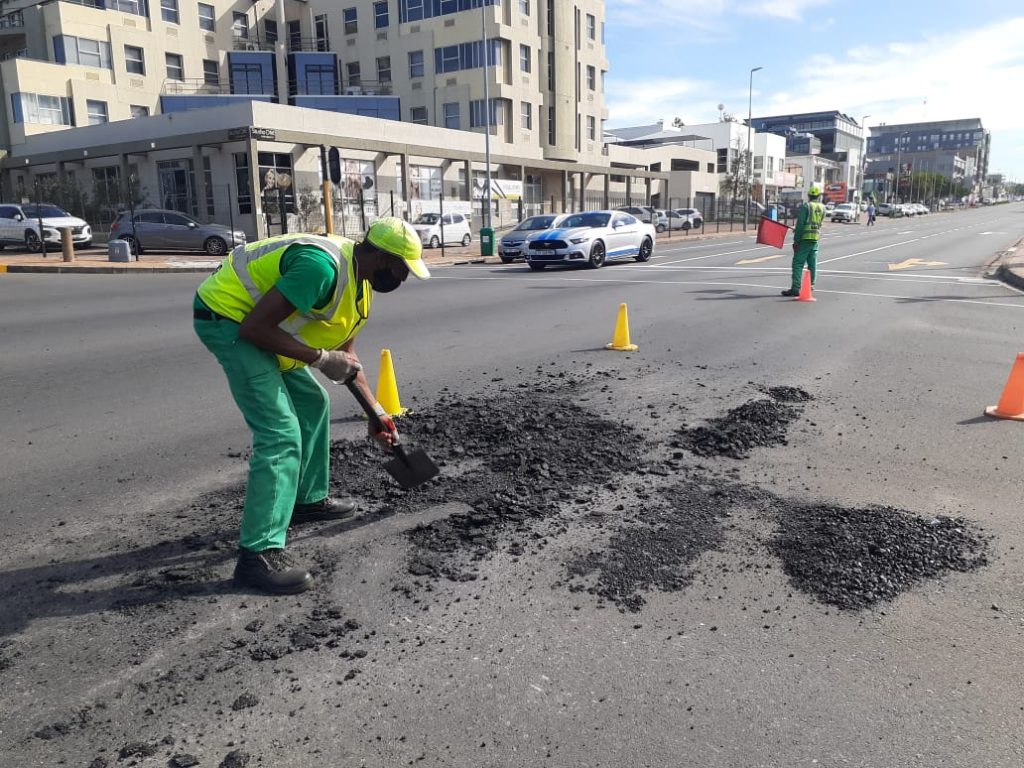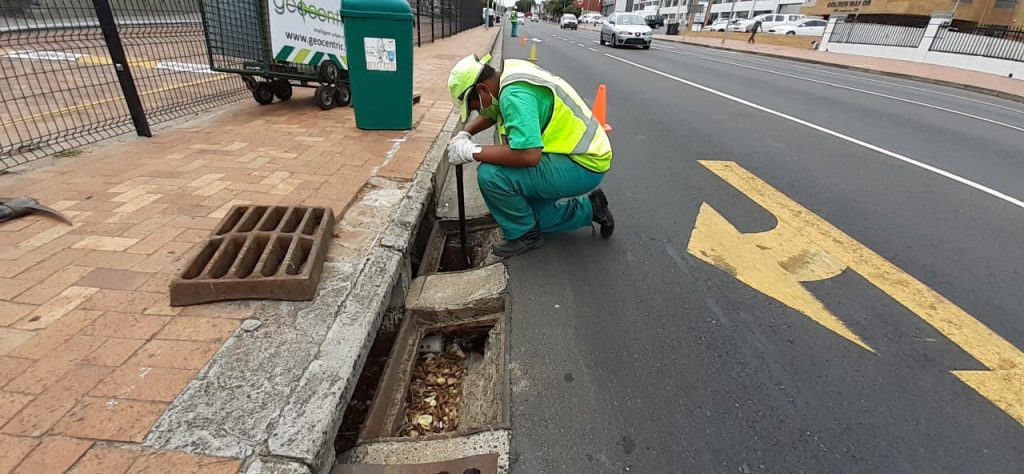Tag Archive for: TVID
Did you know? That annually over 180 000 tons of waste are cleared from illegal dumping hot spots! That costs the city, and you as the taxpayer, a staggering R350 million a year just in clean-up. In other words, cleaning illegal dumping costs 20 times more than collecting waste from wheelie bins. That is why to create a clean, healthy and safe community we take our work tackling illegal dumping very seriously.
“Illegal dumping is a severe problem that puts our community at risk of injury and illness and pollutes our ecosystem. In addition, illegal dumpsites can serve as magnets for other criminal activities,” says Gene Lohrentz, CEO of the urban management company, Geocentric.
Here is what we have learnt when it comes to illegal dumping.
What is illegal dumping?
Illegal dumping is the disposal of unwanted materials in inappropriate places. Be it household rubbish, building waste or industrial debris, improper disposal has disastrous effects on the environment, economy and community.
Our teams are dedicated to cleaning our community and have cleaned thousands of cases of illegal dumping in the last year!
Protecting Property Values
Our daily work with the City of Cape Town’s (COCT) Solid Waste By-law Enforcement Unit protects our district from plummeting property values. By cleaning, we keep our community member’s properties safe by preventing pest issues, blocked storm drains and plastic pollution.
Clean streets don’t just look great, they also improve the value of properties. The study ‘Value of cleaner neighbourhoods’ found that residents will pay up to 57% more to live in a clean neighbourhood. By being part of the solution business owners can help protect and even increase the market value of their property and make their establishments more inviting for customers.
Protecting Public Health
Vermin are attracted to dump sites making these sites sources of disease and infection. Anyone near a dump site risks getting sick both from the hazardous materials dumped and from the diseases spread by rats. These diseases aren’t only formidable – they’re often fatal. Rat urine is responsible for diseases like Leptospirosis ( causing kidney and liver damage) and Hantavirus, a debilitating viral bronchial disease. Rats also gnaw at cables, transformers and electrics causing expensive damage to businesses.
By cleaning up this waste before it attracts vermin, we put a stop to these health hazards before they happen.
Preventing Floods
Water sustains life, but it can also cause widespread destruction, as we saw during the recent flooding in KwaZulu-Natal. As our most precious and essential resource we must treasure it – for if we don’t, we will suffer.
Illegal dumping is a terrifying threat to the water management of our district. When it rains, excess litter is swept into drains and sewers, blocking them and causing trash flash floods. Flooding, and the infrastructure damage it causes, puts immense pressure on emergency services when they are needed most.
To make sure our city can handle the rain we collect all dumping regularly and clean the stormwater drains as part of our winter preparedness programme.
Pulverizing Plastic Pollution
A large percentage of waste illegally dumped is plastic. We are well aware that its consequences are far-reaching, but we are tackling this challenge too. When possible, we sort the waste and recycle what we can instead of sending it all to a landfill. By sorting recyclables, we help reduce the waste in our waterways and create employment opportunities.
We understand it’s almost impossible to recycle all waste. However, we also know that big things have small beginnings. We all make small changes to bring about positive collective transformation. Where possible, we must all take the opportunity to recycle.
How You Can Help Combat Illegal Dumping?
The COCT provides the tools necessary to crack down on illegal dumping and needs citizens to get involved. By reporting dumping you help the City make improvements and encourage others to do the same. Plus, it’s an easy way to beautify your neighbourhood and help keep it safe.
Although the issue is vast, if we all play our part together, we can create a greener, cleaner future for ourselves and future generations.
If you spot something, say something!
To report illegal dumping in your community:
- Call 0860 103 089 or email solidwaste.bylaw@capetown.gov.za.
- If you have the culprit’s vehicle registration number and/or can identify him/her you can shortcut the process and call 021 400 6157
Contact details:
If you have any safety concerns to report, please contact one of the following numbers:
· 10111 – SAPS (South African Police Services)
· 107 – City of Cape Town Disaster Management
· 021 565 0900 – Geocentric Control Room
The saying goes that ‘Great floods flow from simple sources’ and as we prepare for the harshness of the howling gales and pelting rain that make up Cape Town storms, we couldn’t agree more. Many of us are more conscious of the pivotal role that winter preparation plays in city management and what the lack of it can look like as demonstrated in the aftermath of the 2022 KZN floods.
“A combination of terrain challenges, insufficient or ill-maintained infrastructure and increased population density are the main contributors to flooding problems,” says Gene Lohrentz, CEO of urban management company Geocentric.
Here is how we are making sure we are ready to weather the storm:
Creating a clean eco and economically friendly environment:
Did you know that according to the Waste 2020 Market Intelligence Report, the Western Cape created between 138 278 and 162 138 tonnes of plastic waste in 2019? This much plastic equates to an estimated market value of between R473.8 and R631.7 million that is simply not being tapped into because of the manpower and infrastructure required to sort it at scale.
We help turn our trash into cash and create additional value out of waste products by bridging the gap between the litter on the street and the recycling plant. Cleaning and sorting as we go into our appropriate wheelie bins to be recycled directly from the drains and gutters of our streets.
But it is not only our drains. We also sort the content of the public litter bins. We service these bins daily and the plastic bottles, cups and cans are now removed and recycled where possible, instead of sending everything to a landfill.
New Weather Stations:
2022 marks the final rollout of our weather stations. These are vital in monitoring rainfall intensity, giving us information on potential flood areas so that we can preempt pumping them. In our busy districts, the weather also impacts how much accident monitoring we do and helps us ensure we have enough staff to keep infrastructure damage to a minimum and avoid road blockages and closures.
Taking an upstream approach to ocean conservation
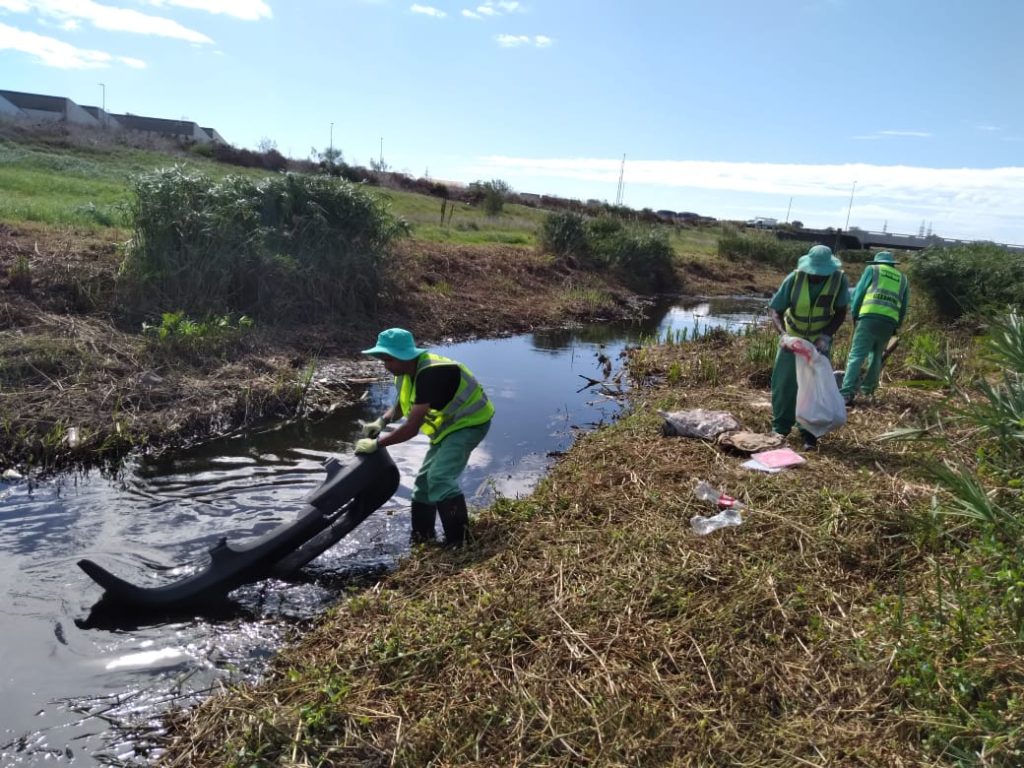
As part of our winter preparedness programme, we haul out all sorts of items from our waterways. This allows heavy rains to safely run along the contours of the land, into the rivers and eventually the sea.
We consistently intervene to keep our drainage system healthy and prevent waste from entering our stormwater runoff systems by methodically cleaning our drain catch pits and drain inlets. Just before winter, we ramp this service up as part of our winter preparedness programme.
Importantly this cleaning means heavy rain runs away from buildings and infrastructure. Preventing damage as much of the cost of flooding is due to the impact that items carried by the water have.
So what happens to all the litter we remove?
You guessed it, most of the litter removed is plastic bottles, glass bottles and cans which are separated and earmarked for recycling.
Trimming the Trees

Every month we carefully trim the trees in our area and report major tree issues to the Recreation and Parks Department and relevant property owners. By professionally caring for our trees before our wind direction changes we prevent any dead, diseased or damaged branches from falling onto people, cars, electric fences, vehicles, and properties. It also serves to help clear any branches that may be blocking lights, alarm beams and security cameras to make sure criminal activity is kept to a minimum.
Here is what you can do to help us and yourself this winter
- Clear the clutter from your gutter so the water can run off to a stormwater drain safely.
- If you do not have additional water tanks ensure your water is draining to stormwater and not sewage drains. To direct rainwater into the sewage system is illegal and can land you with a heavy fine.
- The maintenance of security cameras is just as important as installing them. Dust carried by our winds builds up on the lenses turning into the mud with the first rain and making any evidence not admissible in court so it is best to clean them before the rains start.
While no individual raindrop ever considers itself responsible for the flood we all have a responsibility to pull our weight. Our work forms an essential preventative measure that results in environmentally responsible and sustainable prevention of weather-related challenges such as traffic congestion, property damage, and power outages.
If you notice any weather-related issues please communicate to our Community WhatsApp Group below.
If you have any concerns to report, please contact one of the following numbers:
10111 – SAPS (South African Police Services)
107 – City of Cape Town Disaster Management
021 565 0900 – Geocentric Control Room
0800 872 201 – Give Dignity Initiative
As we approach the Easter weekend many families are looking forward to much needed time spent bonding over easter egg hunts and delicious lunches. However, as we all travel to our destinations, the days leading up to Easter weekend see many more motorists driving further in the first rains of our wet season.
As we set off in these conditions, we urge all motorists to take extreme caution and increase their awareness of the common causes of accidents and other road-users safety.
Here are our top tips for travelling safely this Easter weekend.
Check your vehicle.
Many accidents happen due to vehicles not reacting to a driver’s delayed response If you are travelling in heavy rain, use the brightest setting for your head and tail lights to improve visibility. Ensure that your wiper blades are in good condition as spray from other vehicles reduces visibility considerably so take extra care when overtaking or being overtaken. Braking is significantly impacted by the tread on your tyres so make sure you have sufficient tread. If you experience car trouble, turn on your hazard lights as bright as you can, set up additional warning signs if you have them in your car and pull off the road. Remain seated inside the car especially at night, as glare from your hazards may make it difficult for oncoming traffic to see you.
For more information on how to check your vehicle watch the Arrive Alice video below
Leave early and take breaks.
Due to the increasing amount of vehicles on the road drivers should leave earlier and be prepared for delays on the roads during poor weather conditions. This will help you avoid any abrupt acceleration, excessive speed and sudden steering movements which are the main culprits of accidents. Additionally, adjust your speed and following distance – five to seven seconds to break – to ensure that you can stop safely.
Drivers’ fatigue – caused by long-distance driving after a long day at work or a late night – is also a major contributor to fatal accidents. Emotional stress, lack of sleep, boredom and sun glare all cause fatigue so make sure to get a good seven hours of sleep before you travel. Additionally, for most of us, our sleep-wake cycle is set to be resting between 2 am and 6 am so try not to travel in these low light early hours of the morning.
If you are tired, stop and have a rest. Signs that you are too tired to drive include your eyes shutting, daydreaming, swerving, crankiness, restlessness and frequent yawning or eye rubbing.
Remain aware of other road users.
Last year, approximately 35% of the people who died on the roads over the Easter long weekend were pedestrians – making them the group most affected by accidents. Please remain aware of the sides of the road, particularly when travelling between towns as many people hitchhike to see their families. In areas of particular interest, there will also be signs alerting you to remain vigilant. Once you have spotted a pedestrian, slow down and give them lots of space until you have passed them fully as those who have consumed alcohol are likely to make dangerous decisions. If you can, plan to avoid driving in low light conditions as these combined with bad weather make other road users far more difficult to see.
Do not drink and drive – at all.
According to the new amendments in the National Road Traffic Act, anyone caught with blood that has an alcohol content of more than 0.05% will be arrested, charged with Driving Under the Influence of Liquor and held in custody until they can post bail if bail is not denied. Depending on your record, and the circumstances surrounding your arrest, you face the loss of your driver’s licence, a criminal record, a minimum fine of R2 000, a two-year prison sentence, or all of the above.
To put 0.05% into perspective any more than 350ml of beer, or a single tot of Brandy puts you over the limit with these levels of alcohol remaining in your system for up to eight hours after consumption.
Be aware of the signs of other drivers who may be drunk around you, such as weaving between lanes, accelerating and braking erratically or displaying delayed responses. If you think another driver is intoxicated, put more distance between yourselves and them as quickly and safely as you can. Please also report it by contacting the City’s Law Enforcement, Traffic and Coordination Department by calling 021 480 7700 or the National Traffic Call Centre on 086 140 0800.
By making sure we have road safe vehicles, taking our time getting where we are going, respecting the pedestrians on our roads and never getting on the roads intoxicated we ensure that all of us can enjoy safer roads this Easter.
Headlines From The City
City’s budget will do more to clean up our Mother City
City serious about diverting organic waste from landfills
Comment on the City’s draft Integrated Development Plan 2022 – 2027
Featured image credits : <a href=’https://www.freepik.com/photos/green-road’>Green road photo created by 4045 – www.freepik.com</a>
Mahatma Gandhi said that the true measure of any society can be found in how it treats its most vulnerable members. Unfortunately, as South Africans, we are desensitised in part to the poverty that permeates our ordinary lives. Used to the sight of the radical impact our ever-expanding gap between the haves and have nots creates. While many of us want to help, most are uneducated on the extraordinarily complex issues that create and sustain homelessness.
Due to our own basic understanding of these ever-evolving issues, it makes a greater difference when we partner with and give back to organisations equipped with the infrastructure, skill and experience to combat homelessness and help in a sustainable way.
“Handouts of cash given to desperate – often mentally ill people – add fuel to the same addictions that put them on the streets. Institutions such as our partners at MES have spent decades building, perfecting and maintaining the social infrastructure to efficiently maximise the impact of our donations and the results are inarguable,” says Jaco Wessels, COO of our appointed urban management company Geocentric.
Here are our top recommendations of non-profit organisations active in 2022 and how to contribute to their vision responsibly:
MES
MES Cape Town is a pivotal partner in efforts to sustainably rehome the homeless in many City Improvement Districts. Their extensive network of strong outreach and social relief programmes allows them to provide the reach and resources that our CID requires. They also have a reactive help desk to assist us whenever necessary to meets the immediate and short-term needs of the homeless and unemployed community.
We work with MES extensively to source the individuals that we require as casual labour for project-specific work. The experts at MES also scout out individuals who show promise and then place them with us every week. For those who show dedication, we offer the opportunity to be absorbed on a probationary basis as one of our workers a.k.a our Green Ants. We then provide opportunities for all our Green Ants to become supervisors, further their training and grow into an integral part of our workforce.
To ensure that the funds they generate with us are put to good use, we pay their stipend directly to MES. Who use it to cover the cost of their living expenses sustainably until the end of their stay.
To get in touch, call them on +27 21 949 8736 or send an email to info@mes.org.za.
Visit their website to donate here.
Here are some tips on how you can help responsibly:
- Donate directly to a registered and legitimate NGO in your area. Your donations do not have to be monetary either so be on the lookout for clothing items, towels, tents, blankets, pillows, bags or non-perishable groceries for institutions such as FoodForward SA.
- Support charities and campaigns by advocating to prevent homelessness on social media. By following and sharing posts of organisations such as Women’s Shelter Movement, Ons Plek and Youth Solutions Africa you help grow their followings and advocate their cause.
- Volunteer your time or professional skills. Everyone from the accountants among us to the karate teachers has a unique offering that can improve the lives of those less fortunate – so ask your local charities how you may dedicate your skill to improving their offering.
Since the ratio of people in need of help, and the help available, is so unbalanced many NGOs and NPOs are left with tight funds to run the businesses themselves. By donating your, time, skill, possessions or money in a responsible way you not only help make our district a safer space but provide our homeless residents with the chance to rekindle a sense of pride, community, and dignity.

Cape Town’s fire season occurs from November through to May which are our hottest, and driest months. Together with our beloved south-easterly “Cape Doctor” – which adores clearing our city of pollution – these arid conditions create ideal opportunities for wildfires to spark and quickly rage out of control.
From our homes and businesses to our beloved Table Mountain National Park, there are various organisations in place to manage fire safety and intervene both to avoid fires and to control them when they happen.
It’s true that fires are a part of the South African landscape and occur naturally in grasslands, woodlands, fynbos, and sometimes in indigenous forests. However, there has been a disastrous loss of natural diversity in our fynbos ecosystem and an invasion of Australian wattles, Eucalypts and Mediterranean pines. Now, our fires burn hotter for longer and each fire destroys more than the last. Meaning it’s more important now than ever to actively keep your home, family and business safe and to protect the life and value they hold.
Home and Work Checklist for Fire Safety
- Ember-proofing any area, requires the removal of all flammable plants up to 7m from a building, as well as overhanging branches. Checking and cleaning gutters and roofing for debris is important too.
- Always remember, your safety is first and if you are not properly trained, call for assistance.
- Make sure that all your insurance documents and other important documentation are backed up securely to the cloud.
- Assign tasks to staff and run fire drills so that everyone is prepared in an emergency.
- If you need to stay and help fight fires, cover your head, nose and mouth and protect your eyes with goggles. Wear good shoes and gloves.
- If you have access to water, wet the roof and gutters to stop hot ash from burning the roof.
- Keep grass cut as short as possible as it helps slow the fire.
- Keep a hose pipe rolled up and ready.
- Keep fire extinguishers around that are regularly maintained and train your staff on how to use them safely and correctly.
Other interventions that you can implement on a larger scale include considering your construction materials if you are remodelling and supplementing them for fire-resistant alternatives. You should also ensure full continued compliance with all local and national fire safety codes and think about installing fire protection systems such as overhead sprinklers.
Unfortunately, despite all the precautions, a fire can happen to any size business at any time. That is why protecting your employees and your property should be a top priority. Following the above steps will help you avoid any fires breaking out and minimise fire-related damages. While there may be no such thing as truly “fireproof,” these guidelines are an excellent starting point for safeguarding your business.
Additional Resources
Preventing fires in the Western Cape
City of Cape Town – Basic Household Fire Safety
Fire is Everyone’s Fight Toolkit of guidelines and posters with lesson plans
Sanparks – Fire management / Table Mountain National Park Fire Management Plan
Contact information for the Fire and Rescue Service Department
24-hour emergencies: 107 (landline) or 021 480 7700 (cellphone)
General fire safety enquiries: 021 590 1971 / 021 590 1975
To report a fire : Hotline: 086 110 6417 or The City’s Regional Fire Control No: (021) 590 1900
As we charge into 2022, there is undeniable trepidation surrounding the new challenges and triumphs the year will bring. This year we will continue to create an urban ecosystem that is safe, accessible and inviting to all the workers, visitors and community members of our district. As in years before, we are unwavering in our commitment to the property and business owners of our area and intend to consolidate and elevate our services based on the successes of last year.
In 2022 we strive to:
- Create a safe and clean public environment by addressing issues of maintenance and by cleaning our streets, pavements and public spaces.
- Increase public safety through proactive visible patrolling and by supporting the efforts of the SAPS, City of Cape Town and private security providers.
- Manage existing and new public infrastructure for the future benefit of our community members.
- Decrease property-related crime to protect community members through our security-related partnerships and to protect property values to attract new investment to the area.
- Support the promotion of the businesses in our area by implementing urban greening, promoting energy efficiency initiatives, widening our recycling networks and bettering our risk and disaster management services.
- Support and promote social responsibility in the area and assist with the management and upliftment of people living on the streets.
- Encourage the maintenance and upgrading of private properties and public spaces in the area.
We believe in the heart of our institution that the challenges we face are not insurmountable.
Together with the City of Cape Town, our partners, outreach initiatives and local business owners, we will continue to strive towards reinvigorating our urban environment. Ultimately, together we can create a stable, safe, clean area that is prosperous for our community both economically and socially.
Headlines from the City
The City of Cape Town warns to be aware of scammers posing as electricity officials to gain access to your wallet and home. All officials will have an identification card with the City logo, with their name and surname and a photo. If you have any doubts call the COCT on 0860 103 089 to confirm their ID and work order number.
The City of Cape Town urges their suppliers to be cautious of fake Request for Quotation (RFQ) emails sent to them, as if it is being sent from the City. Please report any suspicious emails to the City for further investigation.
Struggling to pay your rates and taxes? The City of Cape Town has a wide range of financial relief options available. To learn more, click here.
We believe that you are an expert in your area and have seen the positive change we can make first-hand. You know better than anyone, where our precious resources are best spent and we value your contribution in helping us plan for future projects.
The legislative structure governing much of our work in your area is up for amendment. We hope that the proposed changes of making the processes of starting and running a CID more structured will improve the efficiency of CIDs citywide.
Your suggestions on the proposed amendments to the CID by-law and City improvement district policy can be submitted online here, emailed to CityImprovement.Districts@capetown.gov.za or written to, City of Cape Town, PO Box 298, Cape Town 8000
Comments and objections may be submitted from 16 August to 15 September 2021.
It’s no mystery that for many of us, a work commute is an unavoidable and chaotic part of our lives. Shockingly, 1 third of all deaths on our roads are caused by motor pedestrian collisions at speed. Closely followed by passenger deaths, making up 32% of road fatalities. This leaves countless families shattered simply because drivers were in a rush. Our speeding initiative shares our top insights on how to curb speeding in your area.
A common occurrence we see daily in the Tygervalley Improvement District (TVID) is this. Imagine there is a truck or a visitor is pulling into an opposite bay, and you are a driver speeding. You overtake the truck quickly but don’t see the pedestrians walking in front of the vehicle. Leaving you with 0 reaction time to brake.
This causes a potentially fatal collision for the pedestrian. Derails the driver’s life who is liable to criminal charges. Costs the business cleaning up the accident dearly. Most importantly, it is incalculably devastating to the passengers, drivers, and pedestrians’ families.
The solution to stopping speeding? Simple, slow down.
Every morning and afternoon, thousands of dedicated employees make their journey to work by foot, taxi, bus, and car. Here is the good news – we have a simple solution. Simply slow down, pay attention and obey our speeding laws and safer South African streets are just around the corner.
As the Tygervalley Improvement District, we are helping to stop speeding by:
- Making sure all traffic and speeding signs are clearly visible and in good condition.
- Continuing to develop creative ways of implementing sustainable road safety strategies. We are also working together with the TVID population to adjust these programmes to your specific needs.
- Collaborating with the City of Cape Town to implement and maintain traffic speed enforcement measures. These include cameras, speed management obstructions and traffic officers patrolling the greater TVID area.
As a driver, you can help us curb speeding by:
- Slowing down. In industrial areas, the National Road Traffic Act states that drivers should not exceed 60 km/h. This ensures that you have sufficient time to react to unforeseen situations and will avoid unnecessary fines.
- Remaining aware and vigilant. Keep your eyes on the people, other drivers, and potential obstructions in your line of sight and off your cell phone.
- Being aware that the TVID is an industrial area and likely to have pockets of congestion throughout the day. Be mindful to allow yourself more time to get where you are going.
- Being patient. We have many slow-moving vehicles carrying remarkably heavy loads that are too large to manoeuvre quickly so don’t pass when it is not 100% safe.
- Our streets are lined with driveways, side streets and loading bays that trucks need to turn into. Please do not park in any of these zones, as this will lead to a traffic jam until you are found and move your car out the way to safety.
- Maintaining a safe following distance. If you are unsure of what this is for the different vehicle types, watch this excellent video guide on “The Time Distance Ratio” by Arrive Alive.
As a business owner, you can:
- Create parking zones for clients and 3rd party suppliers. This will prevent them from needing to slow down and to park either in an open employee bay or illegally on the opposite side of the road.
- Respect the boundary markings of roads. Red lines, pavements, pedestrian walkways, and cyclist paths are carefully calculated to keep the flow of people into the area safe and swift. Please do not park vehicles in these designated areas.
- Make provisions for pedestrians so your employees and the employees of the businesses around you are not forced to endanger themselves by walking on the road.
- All your employees who come to work in their own vehicles should be educated on the dangers of speeding and carpool where they can to save on parking space.
- Ensure that all employees who need parking bays are provided with a place to put their vehicles. The best time to make these alterations would be during a Facade Improvement intervention.
- If you are a fleet manager – have multiple company cars or have an internal employee transport system – introduce a telematics system. This will allow you to target your speeding awareness interventions to the drivers who need them.
According to the Road Traffic Management Corporation (RTMC), traffic accidents cost our already strained South African economy a whopping R176 Billion in 2020. We also missed the target set out in the UN decade for action road safety amendment by miles, despite a months-long lockdown that restricted movement.
Traffic Enforcement
Traffic enforcement is a last resort for the TVID. While we would prefer not to implement these measures, we are charged with the duty of making the Tygervalley Improvement District safer for all. Traffic enforcement to curb speeding vehicles will be a necessary consequence if we all don’t slow down.
In a time where so many of us are only just scraping by financially, we simply shouldn’t waste money paying expensive traffic fines for speeding incidents that are 100% easily avoidable.
We truly believe that together we can make the roads of the Tygervalley Improvement District (TVID) a safer space for our community and would love to hear your #GoodNews and suggestions, simply mail us at info@tvid.co.za.
If you have any safety concerns to report, please contact one of the following numbers:
- SAPS (South African Police Services) – 10111
- City of Cape Town Disaster Management. – 107
- Geocentric Control Room – 021 565 0900
